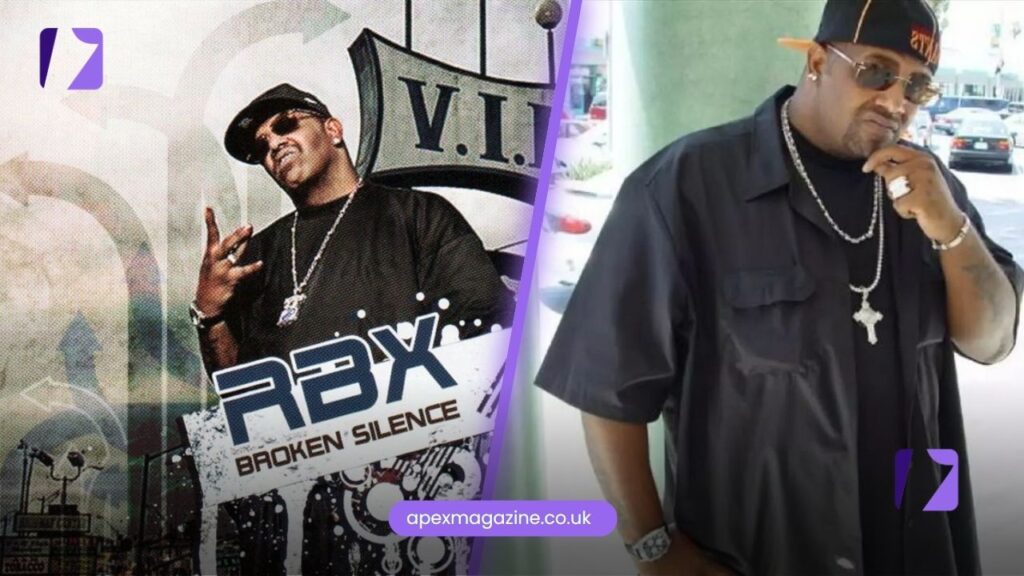Spotify streaming fraud is once again in the spotlight. This time, veteran rapper RBX has stepped forward with serious claims. He believes Spotify has undercut artists by manipulating streams and royalties. His story raises a major question: Are artists truly being paid what they deserve?
Who Is RBX? A Look at His Legacy in Hip-Hop

RBX is a legendary West Coast rapper who played a huge role in shaping early ’90s hip-hop. Born Eric Dwayne Collins, he became known for his deep, gritty voice and his sharp, fearless storytelling. RBX made his mark with powerful appearances on Dr. Dre’s iconic album The Chronic and Snoop Dogg’s classic debut Doggystyle. Even though he didn’t always take center stage, his verses helped define the Death Row Records sound and the rise of G-funk culture. Fans and artists alike respect him for staying true to his roots and speaking his mind. But behind the scenes, RBX says the industry hasn’t always treated him right and now, his latest fight is against Spotify, where he claims streaming fraud has affected his career and income.
- Who Is RBX? A Look at His Legacy in Hip-Hop
- Understanding the Streaming Fraud Allegations
- Spotify’s Royalty Payment System Explained
- RBX’s Public Statements and Evidence
- Artist Experiences: Is RBX Alone?
- The Bigger Issue: Manipulation in Music Streaming
- Legal Rights & Next Steps for RBX
- Spotify’s Response: Silence or Strategy?
- Impact on Fans, Artists, and the Streaming Industry
- What This Means for Independent Artists
- Conclusion
- FAQs
Understanding the Streaming Fraud Allegations
What RBX Claims Happened
RBX says Spotify is not paying him correctly. He believes his music streams are being reduced or miscounted. That means fewer royalties than he should earn.
According to him, artists work hard to create music. But streaming platforms profit more than the people who make the art.
How Streaming Numbers Affect Artist Income
Music streaming has become the main source of income for many artists today but the money earned per play is extremely low. On platforms like Spotify, a single stream often pays only a fraction of a cent, which means musicians need millions of streams just to earn a stable income. When those streaming numbers drop. Whether from issues like missing tracks, incorrect data, or alleged fraud the artist’s paycheck drops too. It doesn’t just affect their earnings in the moment. Lower numbers can also reduce visibility on playlists, shrink their fan reach, and even damage future opportunities like tours or brand deals. For artists like RBX, who rely on accurate reporting and fair compensation, any manipulation or loss of streams becomes a serious threat to their career and legacy.
Spotify’s Royalty Payment System Explained
How Streams Turn Into Revenue
Spotify earns money from subscriptions and ads. Then they share a portion of that revenue with artists and rights holders.
Payment depends on many factors — region, listener type, and contract details.
Why Artists Often Dispute Earnings
The formula is not transparent. Many artists are confused about where the money goes.
Some independent musicians believe the system is built to benefit labels and platforms, not creators.
RBX’s Public Statements and Evidence
Social Media Claims and Interviews
RBX has used his social media presence to speak out against Spotify, claiming he has seen unusual drops and inconsistencies in his streaming numbers. He says that certain tracks with steady listener engagement suddenly showed dramatic decreases in plays and earnings, without any clear explanation. Through posts and live discussions, he has demanded transparency and fairness in how royalties are calculated and reported. His voice quickly gained traction, as fans and other artists started supporting him and sharing similar concerns. Many within the hip-hop community see RBX not only fighting for himself but also raising awareness about deeper industry issues affecting countless independent musicians who rely on streaming platforms to survive.
Proof and Data Behind the Accusations
According to RBX, he is actively collecting data to show exactly where the system is failing artists like him. He believes there are major gaps between the real listener activity and what appears on royalty statements. If numbers can be altered, blocked, or inaccurately reported, then payments can easily be manipulated as well. RBX argues that artists deserve full transparency — real-time access to accurate streaming data and a fair audit process. Without proof of fair accounting, he says, musicians are left guessing about their own success and income. His fight calls attention to a major question: How can artists trust a system they cannot verify? RBX wants accountability not just for himself, but for every artist who feels they are not being paid what they deserve.
Artist Experiences: Is RBX Alone?
Other Musicians Raising Similar Concerns
RBX is not the first to speak up. Many artists have claimed the same issue.
Big and small names have protested low payouts, missing royalty statements, and shady stream reductions.
Industry Experts on Fraud in Streaming
Analysts have reported fake streams, bots, and playlist manipulation for years.
The system is full of loopholes — and artists often lose the most.
The Bigger Issue: Manipulation in Music Streaming
Fake Streams, Bots, and Playlist Fraud
One of the biggest problems RBX highlights is the rise of fake streaming practices. Some individuals and companies buy artificial streams to make songs look more popular than they are. Bots are used to play tracks on repeat, while fraudulent playlists are created to inflate ranking positions. These fake boosts distort the music charts and push genuine artists aside, making it harder for real talent to be recognized. Even worse, streaming platforms struggle to detect and remove. Every fake play leaving an environment where cheating can appear more rewarding than honest creativity. RBX believes this imbalance harms the entire music industry, especially independent artists who work hard to build real audiences.
Who Really Benefits?
According to RBX, the people who gain the most from fraudulent streaming activity are rarely the artists themselves. Major labels, third-party distributors, and shady marketing companies often profit from inflated numbers because high play counts attract more attention and more deals. Meanwhile, the platforms continue earning revenue from subscriptions and ads even when the streams come from bots. Artists who don’t engage in these tactics end up at a disadvantage. They see their rightful position in rankings taken by fake achievements, while their income remains low. RBX insists that if the system rewards manipulation, then fairness becomes impossible and true artistry takes a back seat.
Legal Rights & Next Steps for RBX
Can He Take Action Against Spotify?
RBX believes he has strong grounds to take action if his suspicions about inaccurate stream counts are confirmed. In the music industry, artists have the right to request an audit of their streaming activity and royalty reports. If the data shows any inconsistencies — such as missing plays or incorrect reporting — RBX could demand proper corrections and compensation for the income he may have lost. Legal experts say that artists must be able to trust the numbers that determine their careers. For RBX, this fight isn’t just about money — it’s about the truth.
What Justice Could Look Like
RBX has stated that he wants fairness, not fame from this situation. Justice would mean streaming platforms providing accurate accounting and fixing any errors that affect artist payouts. It would also require more transparency — clear reports that show where streams come from and how royalties are calculated. When musicians put their heart into their work, they deserve payment that honestly reflects their success. RBX is pushing for a system where every artist, big or small, gets what they’ve earned.
Spotify’s Response: Silence or Strategy?
Any Official Statement?
So far, Spotify has not issued a direct public response to RBX’s allegations. This silence could mean they are investigating internally or it could simply reflect confidence in their current system. The company has often defended its payout process in the past, saying it is fair and based on verified streams. However, as more artists raise concerns about royalty transparency, pressure continues to build. Spotify may eventually need to respond, not only to RBX, but to the large number of musicians demanding clearer answers.
Defending a Billion-Dollar Platform
Spotify is one of the world’s biggest music platforms, and defending its reputation is a top priority. The company often highlights its contributions to the music industry — including giving thousands of independent artists a global audience. Spotify regularly argues that its payout model is fair and that streaming has helped reduce piracy and increase overall earnings for musicians.
However, as more artists raise concerns similar to RBX’s claims, the pressure continues to increase. Fans, creators, and even lawmakers are demanding better transparency in how streams are tracked and royalties are calculated. Spotify may remain firm in its stance, but the voices challenging the system are becoming too loud to ignore.
Impact on Fans, Artists, and the Streaming Industry
Trust Issues in Digital Music
Streaming has changed how people connect with music. Fans assume that every play supports the artists they love. But when payments don’t match real listener support, trust is broken — and both artists and fans feel cheated. The RBX situation highlights the need for stronger protections to ensure digital music remains sustainable for creators. If artists cannot earn a fair living from their music, the future of the entire industry could be at risk.
Future Changes to Protect Musicians
The music industry is now facing pressure like never before. As more artists speak out — including RBX — it becomes clear that major reforms are needed. We may soon see stricter regulations that require streaming platforms to provide transparent data and accurate royalty tracking. Governments and music rights organizations could step in to ensure fairness across all digital services.
Artists are also demanding better access to their real streaming numbers — not estimates, not hidden statistics. Clear reporting means musicians can finally understand how their music performs and how much they should be paid. The push for fairness is growing, and experts believe that accountability will shape the next era of the streaming industry.
What This Means for Independent Artists
Lessons and Warnings for the Next Generation
RBX’s fight sends a strong message to new musicians entering the industry. Talent alone is not enough — artists must understand the business behind music. Tracking streaming numbers from multiple platforms, saving royalty reports, and monitoring analytics is now essential. When artists rely on a single platform, they risk losing control over their earnings and their audience. Independent musicians must be smarter, more cautious, and more informed than ever before. RBX’s experience reminds the next generation: protect your work, protect your rights, and never assume the system is working in your favor.
Demands for Better Transparency
IIndependent artists are raising their voices louder than ever. They want clear, honest data — not confusing reports and unexplained drops in streams. Many are demanding third-party audits, stronger fraud detection, and open communication from streaming companies. The goal is simple: fair treatment for every musician, whether they are a chart-topper or just starting out. The industry must grow in a way that supports creativity not exploits it. RBX’s story highlights the need for real change, and his courage is pushing the conversation in the right direction.
Conclusion
RBX’s fight is much bigger than one rapper versus a streaming giant. His voice represents thousands of artists who feel overlooked, underpaid, and trapped in a digital system they can’t control. Streaming has changed how music reaches the world — but the rules have not evolved to protect the creators who make it possible. By speaking out, RBX is demanding transparency, fairness, and accountability from Spotify and the entire music industry. His message is clear: artists deserve to know the value of their own work — and be paid correctly for it. Whether Spotify responds publicly or not, the issue can no longer be ignored. Fans are watching, musicians are uniting, and the future of music revenue is at a turning point.
FAQs
What is streaming fraud?
Streaming fraud refers to fake streams, incorrect reporting, or intentional manipulation of stream counts and royalties.
Has Spotify faced similar allegations before?
Yes. Several artists have criticized low payouts and unclear royalty systems in the past.
How do artists track their real streaming numbers?
Artists rely on dashboards, third-party analytics, and revenue reports from distributors. But complete transparency is still lacking.
Visit More: Minnesota Vikings vs Seahawks









